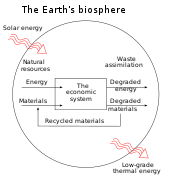Uneconomic growth
| Part of a series on |
| Ecological economics |
|---|
 |

Uneconomic growth is economic growth that reflects or creates a decline in the quality of life.[1] The concept is used in human development theory, welfare theory, and ecological economics. It is usually attributed to ecological economist Herman Daly, though other theorists may also be credited for the incipient idea,[2][3] According to Daly, "uneconomic growth occurs when increases in production come at an expense in resources and well-being that is worth more than the items made."[4] The cost, or decline in well-being, associated with extended economic growth is argued to arise as a result of "the social and environmental sacrifices made necessary by that growing encroachment on the eco-system."[5][6]
Types of growth
[edit]The rate or type of economic growth may have important consequences for the environment (the climate and natural capital of ecologies). Concerns about possible negative effects of growth on the environment and society have led some to advocate lower levels of growth, from which comes the idea of uneconomic growth and Green parties which argue that economies are part of a global society and a global ecology and cannot outstrip their natural growth without damaging them.
Canadian scientist David Suzuki argued in the 1990s that ecologies can only sustain typically about 1.5–3% new growth per year, and thus any requirement for greater returns from agriculture or forestry will necessarily cannibalize the natural capital of soil or forest. Some think this argument can be applied even to more developed economies.
The role of technology, and Jevons paradox
[edit]Mainstream economists would argue that economies are driven by new technology—for instance, we have faster computers today than a year ago, but not necessarily physically more computers[citation needed]. Growth that relies entirely on exploiting increased knowledge rather than exploiting increased resource consumption may thus not qualify as uneconomic growth. In some cases, this may be true where technology enables lower amounts of input to be used in producing the same unit of product (and/or it reduces the amount or hazardousness of the waste generated per unit product produced) (e.g., the increased availability of movies through the Internet or cable television electronically may reduce the demand for physical video tapes or DVDs for films). Nonetheless, it is crucial to also recognise that innovation- or knowledge-driven growth still may not entirely resolve the problem of scale, or increasing resource consumption. For instance, there might likely be more computers due to greater demand and replacements for slower computers.
The Jevons Paradox is the proposition that technological progress that increases the efficiency with which a resource is used, tends to increase (rather than decrease) the rate of consumption of that resource.[7][8] For example, given that expenditure on necessities and taxes remain the same, (i) the availability of energy-saving lightbulbs may mean lower electricity usage and fees for a household but this frees up more discretionary, disposable income for additional consumption elsewhere (an example of the "rebound effect")[9][10] and (ii) technology (or globalisation) that leads to the availability of cheaper goods for consumers also frees up discretionary income for increased consumptive spending.
On the other hand, new renewable energy and climate change mitigation technology (such as artificial photosynthesis) has been argued to promote a prolonged era of human stewardship over ecosystems known as the Sustainocene. In the Sustainocene, "instead of the cargo-cult ideology of perpetual economic growth through corporate pillage of nature, globalised artificial photosynthesis will facilitate a steady state economy and further technological revolutions such as domestic nano-factories and e-democratic input to local communal and global governance structures. In such a world, humans will no longer feel economically threatened, but rather proud, that their moral growth has allowed them to uphold Rights of Nature."[11]
See also
[edit]References
[edit]- ^ Orr, C.J. (2018). "Uneconomic Growth". Encyclopedia of the Anthropocene: 277–285. doi:10.1016/B978-0-12-809665-9.10474-4.
- ^ Daly, H. 2007. Ecological economics: the concept of scale and its relation to allocation, distribution, and uneconomic growth. pp. 82–103 in H. Daly. Ecological Economics and Sustainable Development: Selected Essays of Herman Daly. Cheltenham, UK: Edward Elgar.
- ^ Daly, H. 1999. Uneconomic growth and the built environment: in theory and in fact. In C.J. Kibert (ed.). Reshaping the Built Environment: Ecology, Ethics, and Economics. Washington DC: Island Press.
- ^ Daly, H. 2005. Economics in a full world. Scientific American 293(3): 100–107.
- ^ Daly, H. (26 April 1999). "Uneconomic growth in theory and in fact. The First Annual Feasta Lecture". Feasta Review. Trinity College, Dublin. Retrieved 7 December 2014.
- ^ Daly, H. and Farley, J. 2004. Ecological Economics: Principles and Applications. Washington: Island Press.
- ^ Jevons, W.S. 1865. The Coal Question: An Inquiry Concerning the Progress of the Nation, and the Probable Exhaustion of Our Coal-Mines. London: Macmillan and Co.
- ^ Czech, B. 2006. If Rome is burning, why are we fiddling? Conservation Biology 20 (6): 1563–1565.
- ^ Binswanger, M. 2001. Technological progress and sustainable development: what about the rebound effect? Ecological Economics 36(1): 119–132.
- ^ Herring, H. 2000. Is energy efficiency environmentally friendly? Energy & Environment 11(3): 313–325.
- ^ Thomas Faunce. 'Artificial Photosynthesis Could Extend Rights to Nature. The Conversation 2 July 2013. https://theconversation.com/artificial-photosynthesis-could-extend-rights-to-nature-15380 (accessed 2 July 2013).
Further reading
[edit]- Baker, Linda (May–June 1999). "Real Wealth: The Genuine Progress Indicator Could Provide an Environmental Measure of the Planet's Health". E Magazine: 37–41.
- Cobb, Clifford; Ted Halstead; Jonathan Rowe (October 1995). "If the GDP Is Up, Why Is America Down?". Atlantic Monthly: 59–78.
- Takis Fotopoulos: "The Multidimensional Crisis and Inclusive Democracy", Athens 2005. English online version:[1]
- Rowe, Jonathan; Judith Silverstein (March 1999). "The GDP Myth: Why 'Growth' Isn't Always a Good Thing". Washington Monthly: 17–21.
- Rowe, Jonathan (July–August 1999). "The Growth Consensus Unravels". Dollars & Sense: 15–18, 33.
